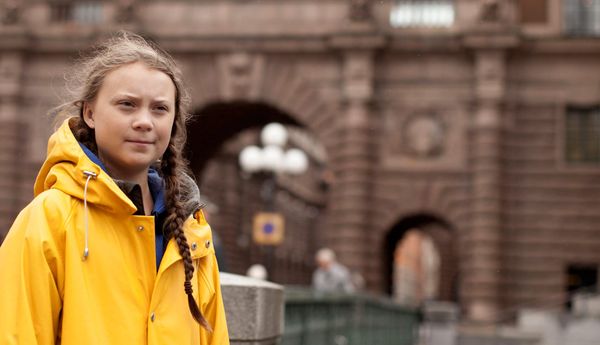Eye For Film >> Movies >> I Am Greta (2020) Film Review
I Am Greta
Reviewed by: Mateusz Tarwacki

Talking about the problems of civilization easily leads to a gloomy, pessimistic perspective - after all, serial information about the increasingly deepening climate crisis is not exhilarating. Nathan Grossman, in his documentary I Am Greta, tries to implement the opposite strategy by following teenage climate activist Greta Thunberg. The teenager bears the responsibility of the leader of the younger generation, fighting for their future. The climate crisis is both the background of the film and the driving force behind the activist’s actions. Grossman tries to look at the now-17-year-old activist holistically, almost fictionalising her coming-of-age.
The fight against climate change and the ossified political system are connected with her personal struggle with Asperger's syndrome and the search for one's place and acceptance in the world. The condition, being part of what Greta is, is both a challenge and an aid in dealing with the Goliath she is facing. "I like routines and I notice details. But once I am interested in something I can get, like, laser focused on it.” says the activist. On the one hand, persistent difficulties in the field of social skills are felt in individual contacts with peers and older interlocutors - the function of a leader is, after all, contact with people. On the other hand, it facilitates conducting discussions and appearing in front of international bodies due to super-focus, fixation on specific matters and interests, being also part of Asperger's syndrome.

I Am Greta gives a glimpse of how little time is left for today's youth to grow up. It is not only about young activists, but simply, young people, for whom the condition of the world and the system controlled mainly by older, white men whose youth lies long forgotten behind them, leaves less and less room for individual decisions about their future - studies, choosing a career path and developing private life. There is not much room left to be oneself.
Being a leader is being lonely. But Grossman, like his heroine, sees the details. In these lonely moments Greta can allow herself to be a child, to cry, to have little joys and games - spontaneous little dances and joyful jumps of an enthusiastic child who sometimes still can be seen in the heroine. Heartwarmingly, the father who accompanies Greta is also the guardian of this childish nature - as if knowingly giving space for action, but also guarding such mundane things as the necessity of having meals.
Grossman balances his film between making a laurel to the contemporary David, the analysis of the complexity of Asperger’s syndrome, which does not have to be treated as a disease, and the support of the family who tries to understand the 17-year-old girl. It all adds up to a Greta's perspective - an optimistic view, intended to build faith in the strength of the individual and possibilities for the young to change the world.
Although the optimism flowing from I Am Greta allows the viewers to understand the mechanism of Asperger’s syndrome and brings us closer to the protagonist herself, the delicacy with which Grossman approached the subject makes the film seem too candy-like and very capitalist in its meaning: it is enough defeat one’s own limitations and persistently pursue the goal to achieve it? In the film, Greta is not only a symbol of resistance, but also an idol. It should be remembered that not every young activist appears at the UN forum, rather having to deal with physical violence in the streets. The images of thousands of teenagers protesting around the world strengthen the monument erected to the Swedish activist, but in fact, her figure should strengthen the message of thousands - after all, the fight is about our future.
Reviewed on: 20 Nov 2020
















